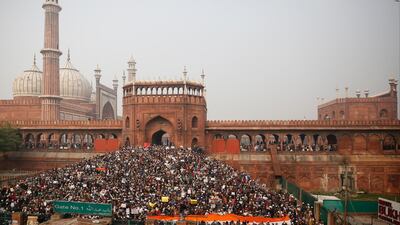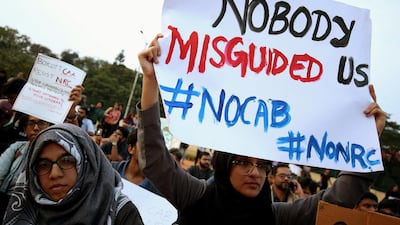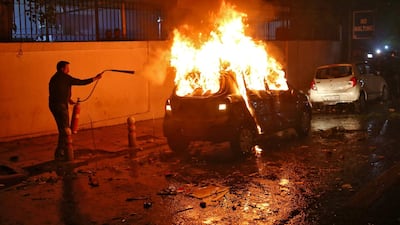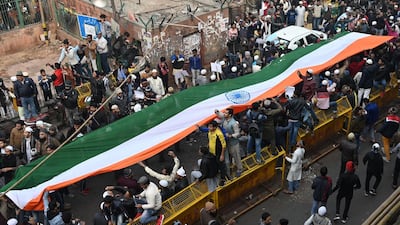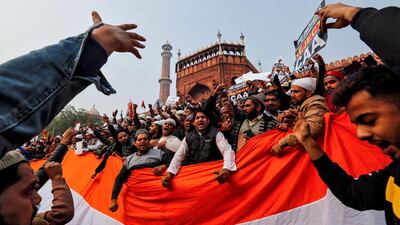At least 14 protesters were killed and dozens more were injured in violent clashes across several Indian cities, including the capital New Delhi, on Friday, in one of the biggest nationwide protests against a new controversial citizenship law that many see as anti-Muslim.
Hundreds of thousands of protesters across the country took to the streets on Friday to demonstrate against the amendment of the Citizenship Act, which grants Indian nationality to immigrants from six non-Muslim religious groups coming from Afghanistan, Pakistan and Bangladesh.
Police banned public gatherings in parts of the Indian capital and other cities for a third day on Friday, cutting off internet services to try and stem the unrest.
At least 4,000 have been detained across the country for defying police bans on demonstrations. Most of the detentions have happened in the state of Uttar Pradesh, where more than 100 have been arrested and 3,305 detained since Thursday, said state police chief OP Singh.
The death toll from the protests rose after Avanish Awasthi, a spokesman for Uttar Pradesh, said late on Friday that six more people had died amid clashes between protesters and police.
Two of the victims were killed in the town of Meerut, when people fired gunshots from a rooftop, said Dinesh Rai, a senior police official in Uttar Pradesh. He said police did not open fire at the protesters and were investigating the deaths.
Police used tear gas shells and live ammunition to disperse what they claimed was a rampaging mob that set fire to vehicles and pelted stones at them.
"Six protesters have died in the clashes in the state," an Uttar Pradesh police official told The National.
Two protesters were shot dead in Firozabad and Bijnor districts of the state, police said, despite government banning public gatherings in the entire state.
Thousands of demonstrators also clashed with police in old Delhi after marching from the historic Jama Masjid.
Police used water cannons and batons to disperse the crowd after they were stopped from marching to the central district.
Protesters set a vehicle on fire and threw stones at hundreds of riot police who had erected barricades to stop their march to Jantar Mantar.
"The protesters of the walled-city had gone back after their protests but suddenly some people from outside came and insisted on letting them move towards India Gate and Jantar Mantar," Mandeep Randhawa, Delhi Police spokesperson said. Protesters of all ages were out on the streets in old Delhi on Friday, ranging from pensioners to students.
Naaz Siddiqui, 36, who works in real estate, told The National: "[Prime Minister Narendra] Modi is like Hitler. He is acting like a dictator and dividing Hindus and Muslims. We are protesting here to make our voices heard. We want the government to hear us, we will not let this government divide the country on the basis of Hindus vs Muslims."
"It is not a fight only for Muslims. It is a fight to save our country,” student Mohammad Hamza, 18, said.
“Modi is trying to break us, divide us. This law is a violation of Article 14 which grants equality to one and all. But this law is discriminatory against Muslims. We demand "re-amendnent" of the law and include Muslims in it,” he added.
Similar protests were held in other parts of the capital city in Muslim-dominated areas, where protesters shouting slogans against Mr Modi, calling him “dictator” and “divider” of people on the basis of religion.
They waved Indian flags and demanded withdrawal of the citizenship law while others wore black bands on forehead as a mark of dissent against the law.
"We are revolting against this government. This protest is not only about Muslims but the whole country. This is a movement for India. They said in the parliament this is not against Muslims but with NRC they are targeting Muslims," said Faisal Ghazi, a protestor at the rally told The National.
In southern part of the city, a fresh protest erupted in the Jamia Millia Islamia university days after violent clashes broke out between police and students. Last weekend, police barged into the campus, and entered the canteen, toilets and hostel rooms and fired tear gas shells and charged students with batons.
The incident spiralled into widespread, decentralised protests across 56 cities in the country, after Mr Modi's Hindu nationalist government pushed through the legislation last week.
Students of at least 40 university and colleges, opposition parties and civil society members held protests defying curbs imposed by administration on gatherings.
Two people were killed in the southern Mangalore city and one in Uttar Pradesh’s capital Lucknow due to gunshots, but the protests continued a day after.
Six protesters perished in India's north-east state of Assam, where natives are worried that the law will allow "Bangladeshi Hindus" to settle in the state.
Mr Modi's government has argued that the law will benefit millions of members of "persecuted" religious minorities fleeing the three countries but the move has angered many Indians who say the law goes against the grain of India's secular constitution. They also fear it could be used against the country's 200-million Muslim population under a proposed move to create a nationwide citizen’s registry.
Opposition Congress party chief Sonia Gandhi expressed her anguish over the ongoing protests and called it “brute repression unleashed by the Bharatiya Janata Party government against the students, youth and citizens across the country.”
“In a democracy, people have the right to raise their voice against wrong decisions and policies of the government and register their concerns. The BJP government has shown utter disregard for people’s voices and chosen to use brute force to suppress dissent. This is unacceptable in a democracy,” Ms Gandhi said in a video address to the country on Friday.

